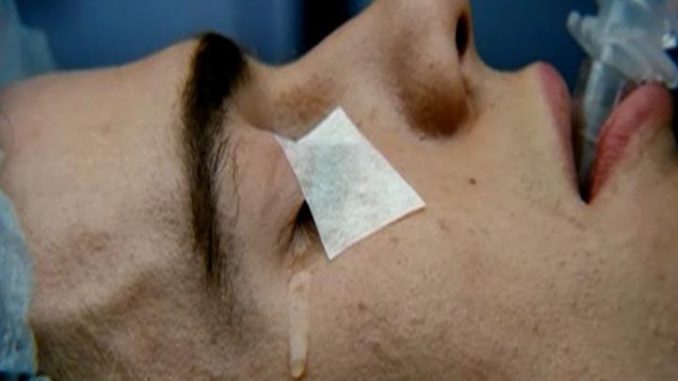
Hospitals are harvesting organs from organ donors while they are still alive, according to a Wall Street Journal exposé that warns new regulations allow doctors to “inject a paralyzer” if the body will not stop moving, in order to “safely” remove the organs.
Oftentimes a hospital can make more money out of a dead body, because of organ harvesting, than they can make by billing a patient whose life they have saved. This is especially true in cases where the patient does not have insurance, and will struggle to pay a hefty medical bill.
The new regulations have proved controversial among medical staff, with many anesthesiologists and nurses removing themselves from the donor register after witnessing “corpses” writhing and jerking during organ removal operations.
WSJ reports: The last time I renewed my driver’s license, the clerk at the DMV asked if she should check me off as an organ donor. I said no. She looked at me and asked again. I said, “No. Just check the box that says, ‘I am a heartless, selfish bastard.’”
What are you giving up when you check the donor box on your license? Your organs, of course – but also much more. You’re also giving up your right to informed consent. Doctors don’t have to tell you or your relatives what they will do to your body during an organ harvest operation because you’ll be dead, with NO legal rights.
Organ Donors are Often Still Alive when their Organs are Harvested
Prior to 1968 a person was declared dead only after their breathing and heart stopped for a determinate period of time. The current terminology “Brain Death” was unheard of.
When surgeons realized they had the capability of taking organs from one seemingly “close to death” person and implanting them into another person to keep the recipient alive longer, a “Pandora’s Box” was opened.
In the beginning, through trial and error, they discovered it was not possible to perform this “miraculous” surgery with organs taken from someone truly dead, even if the donor was without circulation for merely a few minutes, because organ damage occurs within a very brief time after circulation stops.
To justify their experimental procedures it was necessary for them to come up with a solution which is how the term “BrainDeath” was contrived.
Much is being done to get your organs
For an organ to be suitable for transplantation it must be healthy and it must come from a living person.
Once DBD (Donation After Brain Death) or DCD (Donation After Cardiac Death) has been verified and permission extracted from distraught family members (in cases where relatives cannot be located the government often now makes the determination on our behalf) the “organ donor” undergoes hours, sometimes days, of torturous treatment utilized to protect and preserve the body-container of “spare parts!”
The “organ donor” is forced to endure the excruciating painful and ongoing chemical treatment in preparation for organ excising.
Literally the “donor” is now an organ warehouse and used for the sole purpose of organ preservation until a compatible recipient can be located.
Donation after circulatory death (DCD) can be performed on neurologically intact donors who do not fulfill neurologic or brain death criteria before circulatory arrest. This commentary focuses on the most controversial donor-related issues anticipated from mandatory implementation of DCD for imminent or cardiac death in hospitals across the USA.
The truth of the horrific treatment and DEATH OF THE “DONOR”
Organ removal is performed while the patient is given only a paralyzing agent but no anesthetic!
Multi-organ excision, on the average, takes three to four hours of operating during which time the heart is beating, the blood pressure is normal and respiration is occurring albeit the patient is on a ventilator. Each organ is cut out until finally the beating heart is stopped, a moment before removal.
It is well documented the heart rate and blood pressure go up when the incision is made. This is the very response the anesthesiologist often observes in everyday surgery when the anesthetic is insufficient. But, as stated below, organ donors are not anesthetized.
There are growing numbers of protesters among nurses and anesthesiologists, who react strongly to the movements of the supposed “corpse.” These movements are sometimes so violent it makes it impossible to continue the taking of organs. Resulting from their personal experiences and attestations, many in the medical profession have removed themselves from this program altogether.
People who liked this post also liked:
Life is adventure by @moeslimyusuf
We are Discover Steem, if you like our recommendations consider giving us an upvote. :) If you don't wish to receive recommendations under your posts, reply with STOP.
Downvoting a post can decrease pending rewards and make it less visible. Common reasons:
Submit